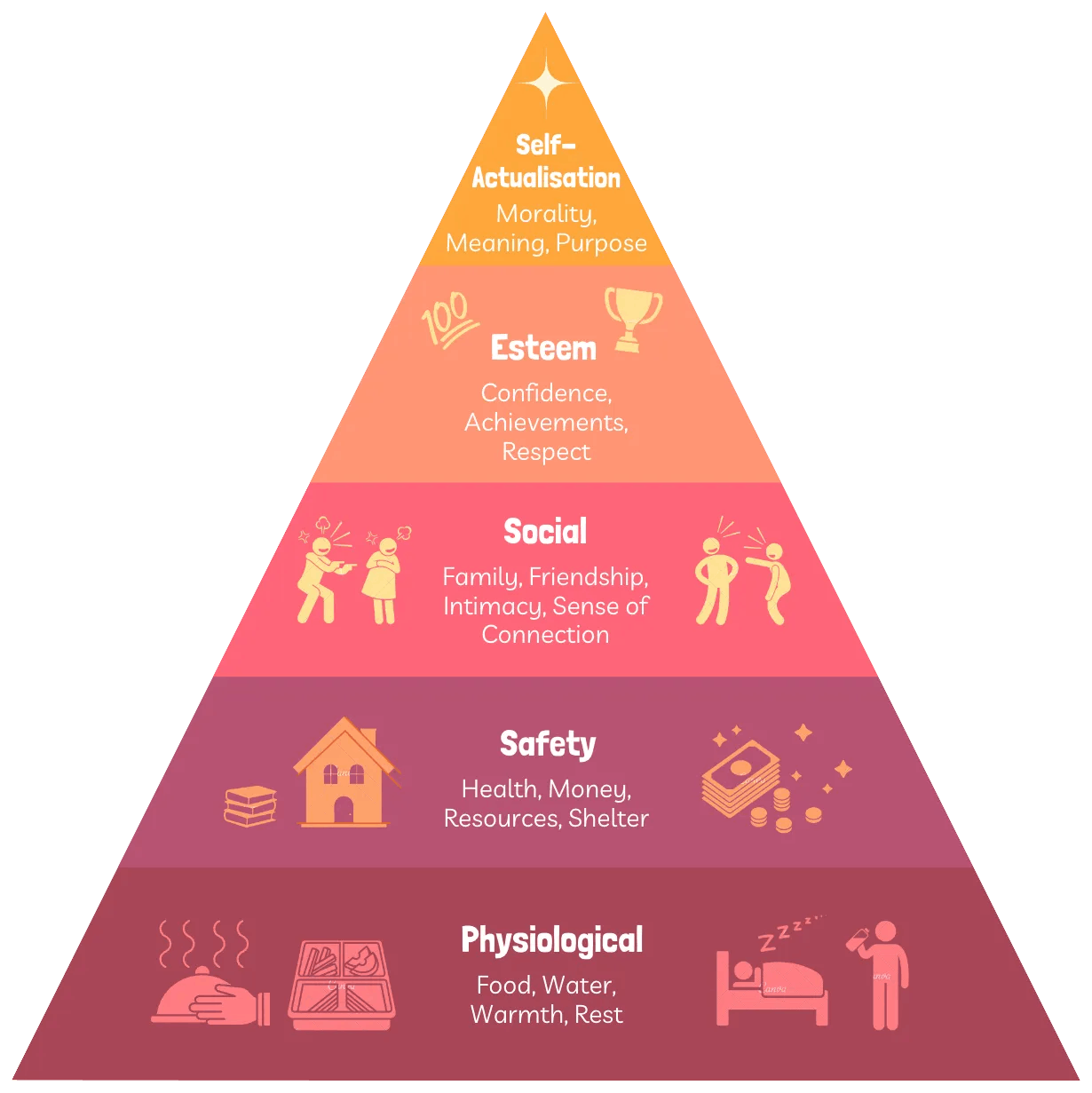
03 Jul Maslow Extremism
Jul 3, 2024
We’re all familiar with Maslow’s pyramid, but let’s review its idea.
Maslow’s Pyramid, also known as Maslow’s Hierarchy of Needs, is a psychological theory proposed by Abraham Maslow in 1943. It suggests that human behaviour is driven by a series of needs that must be met in a specific hierarchical order. The five levels of the pyramid from bottom to top are:
- Physiological Needs: These are the basic needs for human survival, such as food, water, warmth, and rest.
- Safety Needs: Once the basic needs are met, people look to achieve security and safety. This includes personal and financial security, health, and stability.
- Social: After physiological and safety needs are fulfilled, humans seek social belonging through friendships, intimacy, and family.
- Esteem Needs: This level focuses on the need for respect, self-esteem, status, recognition, strength, freedom, and the accomplishment of personal goals.
- Self-Actualisation: At the top of the hierarchy, self-actualisation refers to the realisation of a person’s potential, fulfilment, and the desire to accomplish everything that one can.
It’s important to note that according to Maslow, individuals must satisfy lower-level needs before progressing to higher-level needs.

I appreciate the concept of Maslow’s pyramid because, under normal circumstances, it accurately reflects how we strive to achieve goals in our life. Of course, we can chase the development of good friendships or engage in daily sports activities for better health, but if we lack necessities like food and water, these pursuits become quite difficult.
I say “under normal circumstances” because it can vary in extreme conditions. For instance, in situations of severe danger or crisis, a person might prioritise safety over physiological needs.
Let’s take a moment to think about addressing our basic safety and physiological needs. How do you manage your phone bills, utility bills, taxes, or rent (if you’re renting a house)? What about necessities like food and water? Do you ensure these are taken care of every month, precisely on the due dates for payments, or when you need to go shopping?
Here’s a statement you may not agree with:
If you have to address your physiological and safety needs once or a few times a month, that means a small or significant portion of your energy goes towards re-stabilising the foundation of ``your pyramid``.
If you miss doing this for just one month, the foundation of the pyramid can no longer support the other three levels.
Let me use a metaphor. Imagine a house. You want to build the roof, but every week or month you have to take care of the foundation; otherwise, the whole house will collapse.
Presented in this way, I doubt anyone would consider it practical.
The Idea of The Maslow Extremism
The concept of Maslow extremism builds upon the idea that satisfying lower-level needs before progressing to higher-level ones is not enough. Instead, to effectively operate on the top three levels, we must satisfy the foundational levels – the first two – as thoroughly as possible and ideally for extended periods.
Here’s how to achieve that.
Physiological needs:
- Food and water: Use online delivery services to automate the purchase of certain items for your household. This way, you don’t have to go to the store each time, wondering what to buy and having to carry everything home. If you have storage space in your home, buy a substantial quantity of food, ideally enough to cover several months ahead, focusing on items with a long shelf life. Be sure to install a system for purifying drinking water in your house.
- Clothing: Visit the stores you like most and “stock up” your wardrobe. The goal is to have everything you need for the year ahead. From now on, your visits to the store should purely be for pleasure, not because you urgently need something.
- Health: Schedule complete blood tests annually. This can help you identify if you have low levels of certain vitamins and minerals, for example. Of course, consult with your doctor — but if your body is lacking something, provide it. Consider hiring a personal trainer for the long term — for the next few months, a year or more. This person will keep you accountable for your activity and save you time researching what to eat, how to train, and so on — not to mention the health benefits.
- Household accessories: Buy everything you need for your house. Ensure that going to the store to buy something new for your house is only for pleasure and not out of urgent necessity.
Safety needs:
- Shelter: If you own a house or a flat, make sure to pay all taxes for at least a year ahead. If you rent a house, pay your rent for as long as you can – ideally for a year. You wouldn’t want to think about taxes and rent every 3-4 weeks. You want that off your mind.
- Personal Safety: It’s not advisable to live in a dangerous place, but if that’s the case, install a security system in your house. Ensure that there is a company that takes care of the safety of your home when you are away.
- Stability – A predictable daily routine: For everything that is related to work or business, make a plan for at least a year ahead. You need predictability. Leave unpredictability for when you are enjoying a nice moment or going on vacation.
- Employment: If you are employed, ensure that you have a basic certainty – if possible – that you will have a job for the next year. Nobody can guarantee that, but at least have a signed contract.
- Health Care: Obtain health insurance that can provide you with high-quality medical services and preventive care.
- Savings: Whatever you earn this month, pay yourself first. Open a bank account and the first money you spend should go into that bank account. Later, invest it or do whatever you decide, but your first payment must be to you. Also, be sure to have enough savings for a year ahead in case you have no income for the next 12 months.
- Bills: Pay all your utility and phone bills for a year ahead.
Other:
- Subscriptions: Treat any subscriptions you have as you would your bills. Pay them all for a year ahead if possible. Also, by doing so, you’ll think twice about whether you need a particular subscription.
- Cooking and cleaning: Prepare meals once a week for the entire week ahead. Even better – and this may seem extreme – consider hiring someone to take care of cooking and cleaning in your home.
- Tasks: Reduce the number of daily tasks to the bare minimum.
There is nothing certain in life. Nobody can ensure that the world won’t collapse tomorrow, which could render this extremism pointless. But we’re considering normal circumstances here.
The Ultimate Goal
If you implement at least some of the above, you might be surprised to find out how much energy you used to spend dealing with the first two levels of Maslow’s pyramid daily. There’s no quantitative measure to express the amount of wasted energy, so I’ll use words – it’s a lot!
The ultimate goal is to, over the long period, stop wasting your energy on basic things and instead focus and use it on the other three levels, or whatever else is important to you.
This Requires Money
Yes, that’s right. That’s why my advice — if you decide to embrace Maslow extremism — is to implement everything I mentioned above one step at a time, not all at once.
Earn, implement, repeat.
Key Takeaways
- The concept behind Maslow’s pyramid is sound, but working on the top three levels won’t be as effective as it could be if the needs from the first two levels aren’t satisfied for an extended period.
- Aim to cover as many needs from the first two levels of Maslow’s pyramid as possible, and for as long a period as possible.
